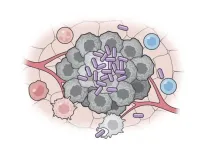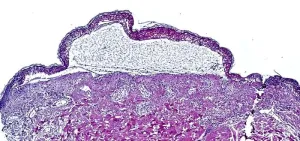Novel therapeutic target overcomes treatment resistance in triple-negative breast cancer
Many patients with triple-negative breast cancer (TNBC) do not respond to combination treatment with chemotherapy and immunotherapy. Understanding what makes these tumors immunologically “cold,” or resistant to therapy, and how to turn them immunologically “hot,” could improve patient outcomes. Researchers led by Xi Chen, Ph.D., identified one such mechanism in which cancer cells can evade the immune system via an ancient stress sensor IRE1α activation, which blocks pathways that would normally ignite “cold” tumors and initiate an immune response. Using an IRE1α-selective inhibitor, ORIN1001, the researchers reversed these effects and prompted a robust immune response in vivo in combination with taxane-based chemotherapy, effectively converting the immunologically “cold” tumors to “hot” tumors. These results highlight IRE1α as a potential therapeutic target to overcome treatment resistance in patients with TNBC. Learn more in Cell.
Relocating kinases leads to promising strategy for cancer cell death
Many cancers rely on oncogenic transcription factors, which have been challenging to target with small molecule therapeutics. Inhibiting transcription with cyclin-dependent kinase 9 (CDK9) blockade has been investigated as an alternative. In a new study, Michael Green, Ph.D., and collaborators developed a way to relocate CDK9 using transcriptional/epigenetic chemical inducers of proximity (TCIPs), small molecules that bring two proteins together, to drive cell death pathways in B-cell lymphoma. They targeted the B-cell lymphoma 6 (BCL6) transcription factor, an oncogene that prevents apoptosis and promotes cell proliferation by suppressing its target genes. These TCIPs repositioned CDK9 in proximity with BCL6, activating the expression of BCL6 target genes to drive cell death. The study provides insights into cancer biology and potential new therapeutic strategies for repositioning transcriptional kinases to target different types of cancer. Learn more in Science.
Specific histone modifications regulate CD8+ T cell functions
CD8+ T cells play a critical role in the immune system's defense against cancer. In a study led by Sangeeta Goswami, M.D., Ph.D., researchers demonstrated that manipulating histone lactylation, an epigenetic modification to regulate gene expression, could improve the efficacy of CD8+ T cell responses in cancer therapies. Specifically, they analyzed the potential roles of H3K18la and H3K9la in CD8 T cells. The study demonstrated that, by targeting metabolic and epigenetic pathways to modulate H3K18la and H3K9la, it is possible to influence CD8+ T cell effector functions, such as enhancing anti-tumor immunity in preclinical models. The study highlights the potential of histone deacetylase (HDAC) inhibitors, already under clinical evaluation, to enhance CD8+ T cell-mediated anti-tumor immunity. Further exploration of these pathways and the different effects of metabolic inhibitors on cancer and immune cells can lead to more efficient therapeutic strategies to improve patient outcomes. Learn more in Nature Immunology.
Machine learning model accurately predicts major adverse cardiovascular events
Blood flow data from cardiac positron emission tomography (PET) scans provide highly predictive information about a patient’s likelihood to experience adverse cardiovascular events during treatment. However, these scans are expensive and not widely available compared to electrocardiograms (ECGs). To alleviate this, a team of researchers led by Jia Wu, Ph.D., used data from more than 3,600 patients to develop and train a new machine learning model that can deliver comparable predictions derived from ECG data. The model, which was validated with an independent data set of over 17,000 patients, proved to be superior to current baseline clinical models in predicting major adverse cardiovascular events. This new model has prognostic potential for risk stratification of patients with coronary artery disease using simple 12-lead ECGs. The team plans to apply this model to detect functional cardiac damage during cancer treatment. Learn more in Cell Reports Medicine.
Combination treatment shows promising results for advanced solid tumors
Immunotherapy is a promising strategy for patients with advanced solid tumors, but not all patients respond well, highlighting a need for additional combinations to improve outcomes. Recent studies suggest that adding antibodies targeting a specific protein, GITR, could help activate T cells for an anti-tumor immune response. Additionally, stereotactic ablative radiotherapy (SABR), which uses a targeted high dose of radiation, could also improve the immunotherapy response. In a Phase I/II study, researchers led by Joe Chang, M.D., Ph.D., and David Hong, M.D., evaluated the safety and efficacy of BMS-986156, which targets GITR, plus immunotherapy, with or without SABR, in 50 patients with advanced solid cancers resistant to standard treatments. BMS-986156 was well tolerated in all cases, with 19 out of 39 (48.7%) of patients achieving stable disease and three (7.7%) achieving a partial response. The group receiving additional SABR showed promising responses, meriting further investigation of this approach for this patient population. Learn more in the Journal for ImmunoTherapy of Cancer.
AI tool improves accuracy and consistency in HER2 breast cancer scoring
Accurate scoring of HER2 is crucial for determining the best breast cancer treatment options, especially with new therapies for HER2-low breast cancers. To provide insights, researchers led by Savitri Krishnamurthy, M.D., reviewed 120 slides of HER2 breast cancer biopsies from different international laboratories to compare manual scoring by pathologists with artificial intelligence (AI)-assisted scoring. The AI tool showed high accuracy, matching expert breast pathologists' scores 92.1% of the time. When pathologists used the AI tool, their agreement with the expert breast pathologists on HER2 scores increased from 75.0% to 83.7%, and their accuracy improved from 85.3% to 88.0%. Notably, the AI tool helped pathologists better distinguish between HER2 0 and 1+ cases, improving both agreement and accuracy in these challenging cases. The findings suggest that this AI tool could enhance HER2 scoring in routine clinical practice, helping to better identify patients with HER2-low breast cancers who may benefit from targeted therapies. Learn more in JCO Precision Oncology.
Awards and honors
Guang Lei, Ph.D., from the Boyi Gan Laboratory, was selected as part of the 2024 class of STAT Wunderkinds by STAT News In case you missed it
Read below to catch up on recent MD Anderson press releases.
Allison Institute scientific symposium features spatial biology breakthroughs, $5 million gift to support further efforts Dual immunotherapy plus chemotherapy benefits specific subset of patients with lung cancer MD Anderson and UICC collaborate to improve women's cancer care Read this press release in the MD Anderson Newsroom.
- 30 -
END





